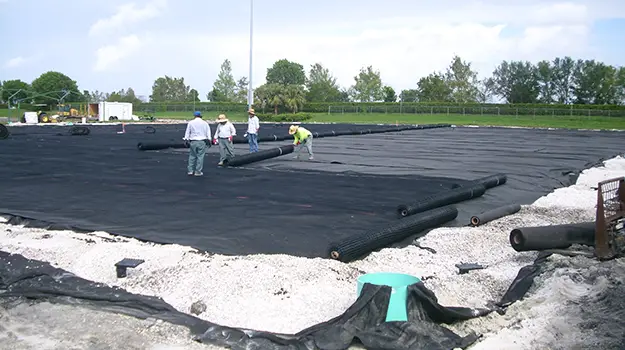Filter Fabric & Geotextile Manufacturers List & Website Directory
By Jack Gray, Roof Online Editor • Last updated April 4, 2024
To learn more about filter fabric and roofing, see our Filter Fabric page.
Return to the Roofing Manufacturer Directory Index

Filter fabric, also known as geotextile fabric, is a permeable material commonly made from woven or non-woven polyester or polypropylene fibers. It’s designed to allow water to pass through while preventing soil, sediment, and other environmental particles from doing so. In the context of roofing, filter fabric can serve a couple of different functions.
Uses in Roofing:
- Drainage Enhancement: Filter fabric is an important component of vegetative roof systems (green roofs). Placed beneath the top layers in roof gardens or green roofs, filter fabric helps to facilitate proper drainage, preventing clogs further down in the drainage system which would lead to water backing up, potentially causing structural damage to the roof.
- Protection Layer: Filter fabric is often used as a protective barrier over ballasted single-ply roof membranes, shielding them from mechanical damage due to foot traffic on the ballast stones (which can develop sharp edges) during installation and maintenance work.
Important Considerations Before Buying:
- Material Compatibility: Ensure the fabric is compatible with other materials used in the roofing system and is suitable for the specific type of roof you are working with.
- Durability: The fabric should be durable enough to withstand the environmental factors it will be exposed to, such as UV radiation, temperature fluctuations, and mechanical stress.
- Permeability: Choose a fabric with the appropriate permeability rate for your application. It should allow water to pass through while effectively filtering out sediments and particles.
- Environmental Conditions: Consider the fabric’s resistance to chemicals, rot, and mildew, especially on roofs that experience high humidity or chemical exposure.
- Size and Coverage: Ensure the fabric comes in rolls or sheets of sufficient size for your project to minimize laps.
Importance of a Reliable Manufacturer:
Choosing a reputable filter fabric manufacturer is a good idea. It will help with:
- Quality Assurance: A reputable manufacturer will provide products that meet industry standards and are less likely to fail, which is particularly important for a roofing application where failure can lead to costly damage.
- Product Consistency: Good manufacturers will ensure that their products are consistent in quality, meaning every part of the fabric will perform as expected, reducing the risk of weak spots.
- Technical Support: Experienced manufacturers often offer technical support and guidance through a publicly-accessible technical department that will help you choose the right product for your specific needs and offer guidance on proper installation techniques.
- Warranty and Guarantees: Reputable manufacturers usually back their products with warranties or guarantees, providing peace of mind and protection against defective materials.
Using the right filter fabric in roofing applications can contribute to the proper performance of the roof, particularly in specialized applications like green roofs. A geotextile from a reliable manufacturer helps guarantee the material’s performance and service life and safeguards your investment.
*****
If you are a reputable and qualified geotextile manufacturer and feel that we’ve overlooked your company, feel free to contact us to ask to be added to this list.
See Geotextile Fabric on Amazon
See Geotextile Fabric at the Home Depot